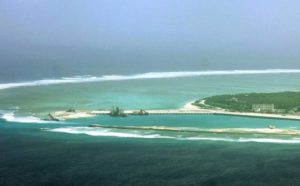 Beijing,: An angry China today rejected as “null and void” the verdict of a UN-backed international tribunal which struck down its claims over the South China Sea saying Beijing has no “historic rights” in the disputed area.
Beijing,: An angry China today rejected as “null and void” the verdict of a UN-backed international tribunal which struck down its claims over the South China Sea saying Beijing has no “historic rights” in the disputed area.
China “neither accepts nor recognises” the ruling of a tribunal in the South China Sea arbitration established at the request of the Philippines, the Chinese Foreign Ministry said.
“The award is null and void and has no binding force,” it said in a statement minutes after the five judge tribunal appointed by the Permanent Court of Arbitration delivered its judgement striking down Beijing’s claims of historic rights over the area, strongly disputed by the Philippines, Vietnam, Malaysia, Brunei and Taiwan.
China’s territorial sovereignty and maritime rights and interests in the South China Sea (SCS) shall under no circumstances be affected by those awards. China opposes and will never accept any claim or action based on those awards, the statement quoted by state-run Xinhua new agency said.
“China has territorial sovereignty and maritime rights and interests in the South China Sea,” said a separate statement titled ‘Statement of the Government of the People’s Republic of China on China’s Territorial Sovereignty and Maritime Rights and Interests in the South China Sea’.
“China is always firmly opposed to the invasion and illegal occupation by certain states of some islands and reefs of China’s Nansha Qundao (the Nansha Islands) (called by Philippines as Spratleys), and activities infringing upon China’s rights and interests in relevant maritime areas under China’s jurisdiction,” it said.
China’s strong reaction came after the tribunal struck a blow to its claims over almost all of the SCS, saying that its much touted nine-dash line has has no legal basis.
Striking down the core of China’s claims over the 90 per cent SCS based on historic rights, the tribunal ruled there was no legal basis for China to claim “historic rights” to resources within the SCS falling within its claimed nine-dash line, which is based on a Chinese map dating back to 1940s.
It concluded that “to the extent China had historic rights to resources in the waters of the SCS, such rights were extinguished to the extent they were incompatible with the exclusive economic zones provided for in the Convention” (UN Convention on the Law of Seas.
“The tribunal also noted that, although Chinese navigators and fishermen, as well as those of other States, had historically made use of the islands in the SCS, there was no evidence that China had historically exercised exclusive control over the waters or their resources,” it said.
For decades China, which boycotted the tribunal questioning its legality, has been asserting that its emperors have discovered the islands hundreds years ago and have been exercising control over the area throughout the history.
But its claims came into conflict with the Philippines, Vietnam, Malaysia, Brunei and Taiwan as they hardly have exclusive economic zones (EEZ) provided by UNCLOS which Beijing declined to recognise. .
